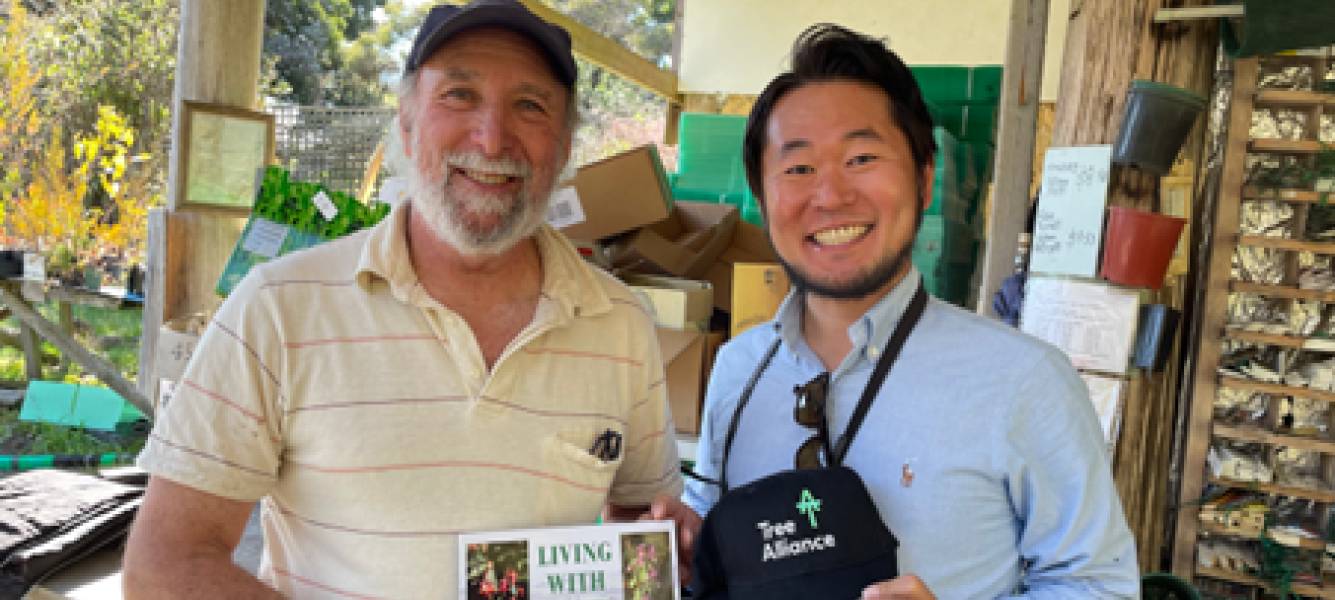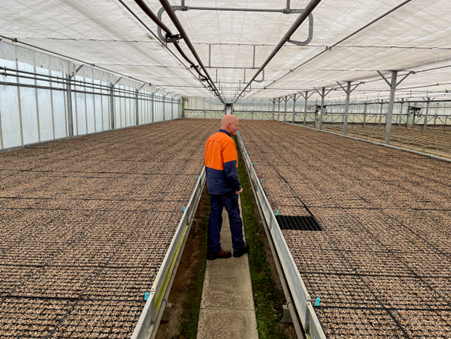
A journey of agroforestry knowledge exchange
Posted 02 November 2023
PFT Agriforester Molly Marshall embarked on an eye-opening journey to Japan in April, where she joined a group of Australian forest industry leaders for a knowledge exchange tour across central Honshu to delve into the intricacies and opportunities within the Japanese forest sector.
Molly's visit to Japan was more than just a professional endeavour; it was an international collaboration aimed at fostering a deeper understanding of agroforestry
. Throughout the trip, Molly had the privilege of networking with a diverse group of individuals, including land managers, foresters, farmers, and Japanese officials. These interactions illuminated the multifaceted challenges and possibilities that the Japanese forest sector faces.
One of the key outcomes of this exchange was the opportunity to build strong international relationships. Molly connected with Kaz Kagohashi, a Global Landcare board member and the facilitator of the knowledge exchange. Together with his wife Saori, they recently visited Australia as part of a fellow program with the Australian National University.
In a show of camaraderie, Molly and her husband Andy extended their hospitality to Kaz and Saori during their visit in October.
The Australian experience included a closer look at Tasmania's forest sector and a tour of the local native forest nursery, Oldina Nursery. Owner Jim McLeod guided the guests through the nursery, showcasing a range of native rainforest species such as Huon, celery top, sassafras, pencil, and king billy pines.
The exchange participants also made a stop at Fossil Bluff in Wynyard, where the Wynyard Landcare group had established plantings.
These plantings not only addressed erosion concerns but also served as a welcoming habitat for birds and bees, nurturing the native wildlife.
For an in-depth understanding of the diverse multipurpose plantings in Tasmania, Forico Nursery hosted Kaz and Saori for a detailed tour of the Somerset nursery. Nurseryman Scip guided the visitors through the process of growing Tasmania's three primary commercial tree species: eucalyptus nitens, eucalyptus globulus, and pinus radiata.
The tour's grand finale took place at the properties of Graham Freeman and Chris Franks in Milabeena. Both landowners have demonstrated the creation of value-added timber products through silviculture management and careful species selection.
Graham Freeman's remarkable California redwoods, cultivated over 38 years, have been selectively harvested and milled locally within Tasmania. Equally impressive were Chris's high-pruned pinus radiata trees, which are now 28 years old.

Molly's journey was a testament to the power of international collaboration and knowledge sharing in agroforestry.
Private Forests Tasmania would like to extend its gratitude to all the companies and individuals who generously hosted and welcomed our international visitors.
This exchange has not only enriched Molly's understanding of agroforestry, but also nurtured invaluable connections between two nations sharing a passion for sustainable forest management.
As Molly's journey demonstrates agroforestry is a global endeavour and the exchange of knowledge is vital to its success. Through initiatives like these, the world's forests can be better understood and sustainably managed for generations to come.

Share this Article
Latest Articles
-

17 September 2025
Celebrating excellence at the Tasmanian Timber Awards
-

17 September 2025
Forest Practices Authority Research Update Day
-

13 August 2025
Have you seen our Stems for CO2 Project signage on the Midlands Highway?
Archives
- ActivAcre hits milestone, calls for more farmers to get on board
- Napier's leading the way in sustainable forestry and carbon-neutral farming
- Sound science needed to assess carbon impacts of timber harvesting
- Newly appointed TFFPN Board of Directors
- Graduate Certificate of Forestry Scholarship
- Forestry Australia Mentoring Program 2025
- Forest Industry Roundtable planning for the long term
- Eagle Management Constraint Period extended
- Successful private native forest management celebrated
- $15 million investment in new ship loader to boost Bell Bay's forestry exports
- Standing with Tasmania's forestry industry: buy local
- TFPA: Tasmanian Freight Equalisation Scheme needs a ground-up review
- AFCA Gala Dinner celebrates industry excellence
- Fire permits now required Statewide
- Forest leaders hone skills in sustainable native regrowth management
- Tasmanian forests and the carbon market: Barriers and opportunities
- Spring is the time for fuel reduction burning
- Primed for Growth: A situation analysis of the Tasmanian Forest and Wood Products Sector
- Audit requirements cut for low-risk plantation projects
- Guidance and support for landowners after damaging winds
- Forestry Australia welcomes further definition of active forest management
- Farm & Forest Mapper Tool highlighted at Rural Youth Tasmania's Young Farmer of the Year competition
- Senate Select Committee inquiry into the Tasmanian Freight Equalisation Scheme
- Timberlink announces new wood composite products brand
- Newly developed protocol a vital tool for safeguarding forestry industry
- Red Hot Tips: Fire management for Tassie farmers
- Bioenergy: Fuelling industries with trees
- Harvesting trees: What you need to know
- Shelterbelts: How are they contributing to farm systems?
- Infill plantings and remnant vegetation: Why biodiversity depends on a thriving understory
- Plantation planning: The key to a successful plantation
- Exciting interactive forestry knowledge hub launched
- $450,000 farm forestry grant recipients revealed



